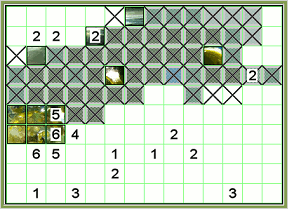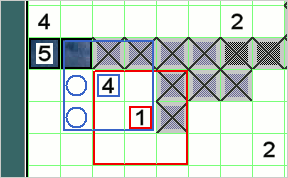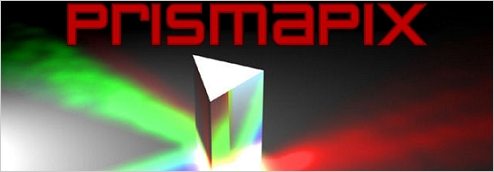![]() Fun Five-Letter Word Of The Day: Prism. Scientifically speaking, prisms are transparent blocks with angled edges that can disperse white light into a spectrum of colors. Non-scientifically speaking, it's what you see on the cover of Pink Floyd's "Dark Side of the Moon" album. Gamingly speaking, prisms were the inspiration for PrismaPix, a picture logic game from KPix Games.
Fun Five-Letter Word Of The Day: Prism. Scientifically speaking, prisms are transparent blocks with angled edges that can disperse white light into a spectrum of colors. Non-scientifically speaking, it's what you see on the cover of Pink Floyd's "Dark Side of the Moon" album. Gamingly speaking, prisms were the inspiration for PrismaPix, a picture logic game from KPix Games.
 The sort of logic that you'd use in a round of PrismaPix is similar to that of a game of Minesweeper or Conceptis Puzzles' Fill-a-Pix. The numbers scattered across the screen represent how many immediately surrounding squares are to be filled in, including the square with the number itself. (This means that you can see numbers as high as 9, instead of Minesweeper's usual 8.) To fill in a square and see that portion of the picture, left click. To mark a square as definitely not being filled in there (with an "X"), right click.
The sort of logic that you'd use in a round of PrismaPix is similar to that of a game of Minesweeper or Conceptis Puzzles' Fill-a-Pix. The numbers scattered across the screen represent how many immediately surrounding squares are to be filled in, including the square with the number itself. (This means that you can see numbers as high as 9, instead of Minesweeper's usual 8.) To fill in a square and see that portion of the picture, left click. To mark a square as definitely not being filled in there (with an "X"), right click.
However, PrismaPix differs from similar logic puzzles, as you are not solving one grid of numbered squares at a time, but several grids, from three to eight. Each grid represents a dominant color, which appears in all of the filled-in squares in that grid (or some close shade, if not the exact color). Each square will be filled in exactly one of the grids, which means that filling in squares in one grid will put X's on all of the other grids in that same location. Similarly, Putting an X in the same square in all but one layer will automatically fill in the square on the remaining layer. When you deduce which layer each square is filled in on, the finished picture is revealed. Yay, you win!
PrismaPix offers three levels of difficulty to fit your puzzling tastes. The easy level gives you clues focusing on one number at a time (for example, two of the squares surrounding a 7 are X'ed out, which means you fill in the other seven squares). The medium level picks up the difficulty by asking you to compare the overlap created by two adjacent numbers (when a 1 is right next to a 4), and the hard level widens the logical possibilities (when a space separates a 2 from an 8, or when a 1 is a chess knight's move away from an 8... it makes sense when you try it out). In addition, you can choose to have the computer let you solve the puzzle unaided, or you can choose to have it tell you when you've made a mistake, or you can play in "Sudden Death" mode (my personal favorite), where one incorrect click sends your entire puzzle up in flames, sending you back to the beginning (or your last save point, if you remembered to make one).
 Analysis: First things first, it must be said: PrismaPix is not a pretty game. Or at least, it's not pretty in the sense that a PopCap or GameLab game or something from another large game production company might be. The interface is very basic and blocky, almost no frills whatsoever. The included music, a variety of classical music MIDI files, might get a bit grating after a bit, and you might find it more pleasing to mute the MIDI and put on your own iTunes playlist. The victory screen consists of random juxtapositions of the picture with an unrelated quote. It would be easy to shrug off a game like this, just for the lackluster presentation.
Analysis: First things first, it must be said: PrismaPix is not a pretty game. Or at least, it's not pretty in the sense that a PopCap or GameLab game or something from another large game production company might be. The interface is very basic and blocky, almost no frills whatsoever. The included music, a variety of classical music MIDI files, might get a bit grating after a bit, and you might find it more pleasing to mute the MIDI and put on your own iTunes playlist. The victory screen consists of random juxtapositions of the picture with an unrelated quote. It would be easy to shrug off a game like this, just for the lackluster presentation.
However, one cannot overlook the fact that PrismaPix is still a very clever twist on a familiar genre. Unlike other similar puzzles that have you solving one static, black and white picture, PrismaPix takes advantage of stunning photographs and adds some much needed color to logic puzzles. While you can predict the final pixeled picture of other puzzles, PrismaPix guarantees that you know the end result: Every square is filled in. But what do the mysterious grids hold? The "multidimensional" spin puts the traditional logic puzzle in a new light.
Even if you only try the demo of this game, you're still presented with a LOT of puzzles to solve. Each "Puzzle Pack" has 25 pictures in it, each of which can be solved in all three levels of difficulty. (The picture, and hence, the layers of the picture, do not change, but it's unlikely that you'll memorize the exact positions of everything when you switch between levels.) Buying the full version unlocks over 1000 other puzzles in themed Puzzle Packs, with new puzzles released periodically.
PrismaPix is definitely a game for the whole family. The adjustable levels of difficulty and puzzles of all sizes are good for the young as well as old. And whether you're just getting started and still using the computer's help to fix errors or playing Sudden Death where a mistake feels like the equivalent of the school bully pushing over your tower of blocks, you still feel a sense of accomplishment when you finish a picture and get to see it proudly tiled across your screen.
So while it might lack the bells, whistles, and animated animals with excessive cuteness that other games might have, PrismaPix still holds a solid, addictive game with a creative twist. It's easy to learn, no matter which level of difficulty you go for. Try PrismaPix, and experience puzzling, as though presented through a prism.
![]() Windows:
Windows:
Download the demo
Get the full version
![]() Mac OS X:
Mac OS X:
Not available.
Try Boot Camp or Parallels or CrossOver Games.






Update